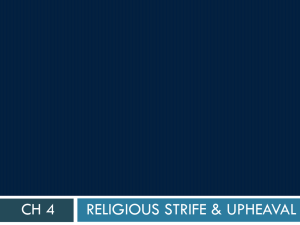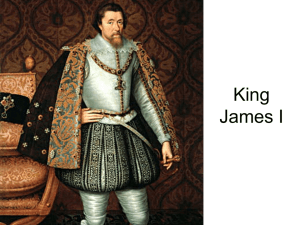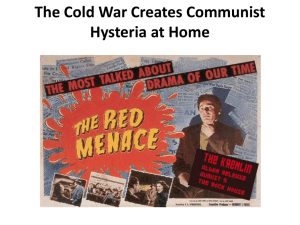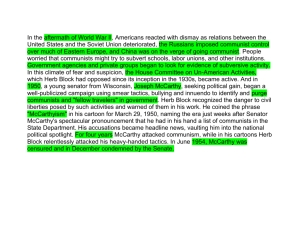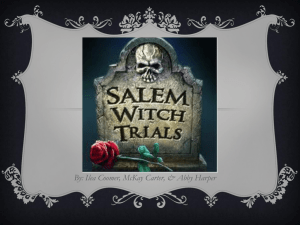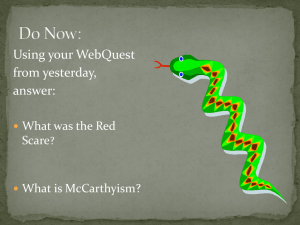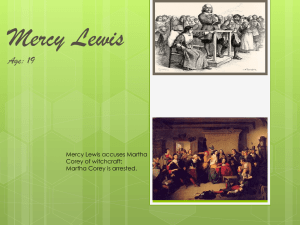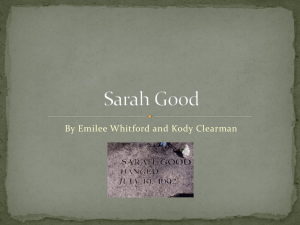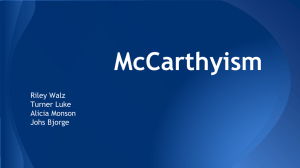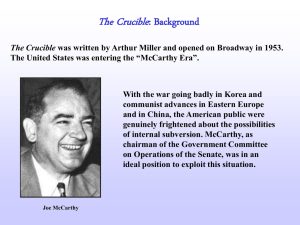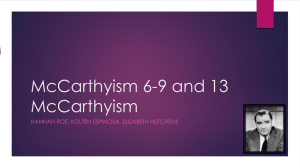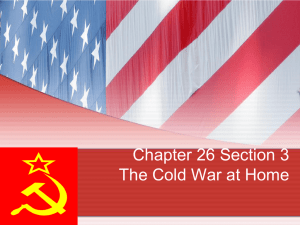The Crucible Introduction
advertisement
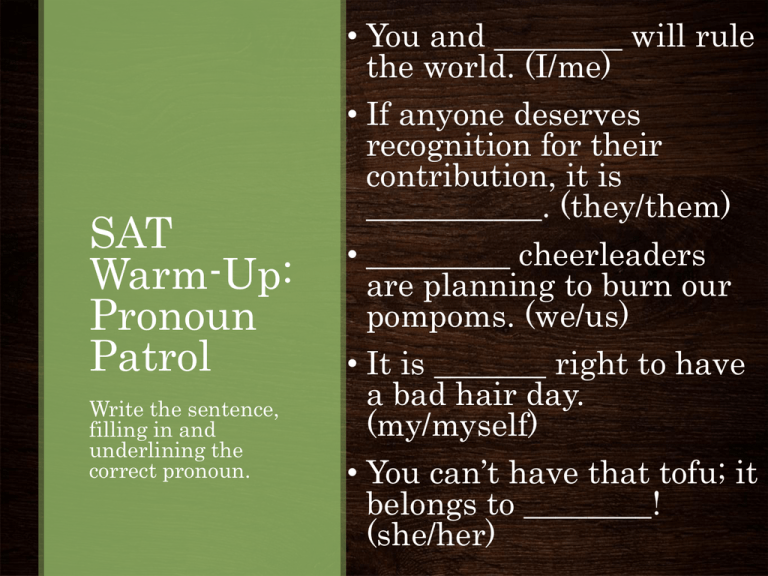
SAT Warm-Up: Pronoun Patrol Write the sentence, filling in and underlining the correct pronoun. • You and ________ will rule the world. (I/me) • If anyone deserves recognition for their contribution, it is ___________. (they/them) • _________ cheerleaders are planning to burn our pompoms. (we/us) • It is _______ right to have a bad hair day. (my/myself) • You can’t have that tofu; it belongs to ________! (she/her) 11.) Non sequitur: Literally, “does not follow.” A conclusion or statement that does not arise logically from the premises of a given argument. 12.) Red herring: Avoiding the “real” argument by introducing something irrelevant or tangentially related, thereby changing or shifting the topic of discussion. 13.) Straw man fallacy: Attempting to strengthen your own view by distorting the opposing view or making it seem overly simplistic. The opposing view thus becomes a “straw man” that you can knock down easily. This technique usually hurts your credibility. True or False • Confessing to a crime you didn’t commit in order to avoid punishment is wise. • The difference between right and wrong is clear. • It is better to die for what you believe in rather than to lie to save your life. • It’s more difficult to forgive yourself if the person you have hurt doesn’t forgive you. • Courage means doing something even though it can be difficult and fearsome. • A person is innocent until proven guilty. • Justice is best determined in a court of law. SAT Vocabulary Abhor: hate Bigot: narrow-minded, prejudiced person Remuneration: payment for work done Demographers and anthropologists have corrected the notion that European explorers in North America entered a ------ territory by showing that the land in some areas was already as densely ------ as parts of Europe. a. fertile…settled b. colossal.. wooded c. desolate… populated d. valuable…exploited e. hostile…concentrated • allegory: The device of using character and/or story elements symbolically to represent an abstraction in addition to the literal meaning. In some allegories, for example, an author may intend the characters to personify an abstraction like hope or freedom. The allegorical meaning usually deals with moral truth or a generalization about human existence. AP Language Vocabulary Be reviewing your Logical Fallacies for your quiz on Thursday (B1) Friday (A2) • ambiguity: The multiple meanings, either intentional or unintentional, of a word, phrase, sentence, or passage. • antecedent: The word, phrase, or clause referred to by a pronoun. The AP language exam occasionally asks for the antecedent of a given pronoun in a long, complex sentence or in a group of sentences. A question from the 2001 AP test as an example follows: – “But it is the grandeur of all truth which can occupy a very high place in human interests that it is never absolutely novel to the meanest of minds; it exists eternally, by way of germ of latent principle, in the lowest as in the highest, needing to be developed but never to be planted.” The antecedent of “it” (bolded) is...? The Crucible (1954) B Y: A R T H U R M I L L E R American Drama Types of Characters • Drama has many of the same types of characters that are found in fiction. – The protagonist is the central character of the play. This character is at the center of the conflict and often undergoes radical changes during the course of the play. – The antagonist often opposes the protagonist, giving rise to the central conflict of the play. – Some plays also include a foil, a minor character who provides a striking contrast to another character. Interplay among these characters heightens the dramatic tension as the play develops. The names of all a play’s characters are listed in the cast of characters at the beginning of the play. American Drama (cont.) Speech Devices • In drama, the playwright develops the story line through the characters’ actions and dialogue. Virtually everything of consequence—from the plot details to the character revelations—flows from dialogue, or conversation between characters. • Other speech devices used by playwrights include – Monologue: a long speech spoken by a single character to the audience or another character – Soliloquy: a reflective speech in which a character speaks his or her private thoughts aloud, unheard by other characters – Aside: a short speech or comment that is delivered by a character to the audience but is not heard by other characters who are present Puritanism • Christian faith that originated in England in the early 1600s. • Puritans believed in predestination. • They split from the Church of England in 1633. • Many emigrated to the American colonies. • Their radical beliefs flourished in the new world. Witchcraft in Salem • Like all Puritans, the residents of Salem Village believed in witches and in witchcraft. • They believed that witchcraft was “entering into a compact with the devil in exchange for certain powers to do evil.” • They considered witchcraft both a sin and a crime; it was a very serious accusation, which was carefully and thoroughly investigated. • The witchcraft hysteria began in Salem, Massachusetts, in early 1692. • Reverend Samuel Parris’s daughter and Abigail Williams started having fits of convulsion, screaming, and hallucination. – A doctor examined the girls and concluded that they only explanation for these bizarre behaviors was witchcraft. Witchcraft in Salem • During the next eight months of terror, more than 150 people were imprisoned for witchcraft. • By the time court was dismissed, 27 people had been convicted, 19 hanged, and 1 pressed to death. • The hysteria that snowballed in Salem reveals how deep the belief in the supernatural ran in colonial America. McCarthyism • McCarthyism is the term used to describe a period of intense suspicion in the United States during the early 1950s. • It began when Senator Joseph McCarthy, a U.S. senator from Wisconsin, claimed that communists had infiltrated the Department of State. • A special House Committee on Un-American Activities was formed to investigate allegations of communism. • During this period, people from all walks of life became the subjects of aggressive “witch hunts” based on inconclusive, questionable evidence. McCarthyism • Persons accused of being communists were often denied employment in both the public and private sector. • In the film industry alone, over 300 actors, writers, and directors were denied work in the U.S. • American writer, Arthur Miller, was one of those alleged to have been “blacklisted.” Arthur Miller (1915-2005) • American playwright and writer • In 1953 he wrote The Crucible, which uses the Salem witchcraft trials of 1692 to attack the anti-communist “witch hunts” of the 1950s. • He believed the hysteria surrounding the witchcraft trials in Puritan New England paralleled the climate of McCarthyism – Senator Joseph McCarthy’s obsessive quest to uncover communist party infiltration of American institutions. • He refused to give information regarding his colleagues and was found guilty of contempt of the court. His sentence was later overturned. Fire! Herb Block’s History POLITICAL CARTOONS FROM THE MCCARTHY ERA The Cause • In the aftermath of World War II, Americans reacted with dismay as relations between the United States and the Soviet Union deteriorated, the Russians imposed communist control over much of Eastern Europe, and China was on the verge of going communist. • People worried that communists might try to subvert schools, labor unions, and other institutions. • Government agencies and private groups began to look for evidence of subversive activity. In this climate of fear and suspicion, the House Committee on UnAmerican Activities, which Herb Block had opposed since its inception in the 1930s, became active. • In 1950, a young senator from Wisconsin, Joseph McCarthy, seeking political gain, began a well-publicized campaign using smear tactics, bullying and innuendo to identify and purge communists and "fellow travelers" in government. • Herb Block recognized the danger to civil liberties posed by such activities and warned of them in his work. • He coined the phrase "McCarthyism" in his cartoon for March 29, 1950, naming the era just weeks after Senator McCarthy's spectacular pronouncement that he had in his hand a list of communists in the State Department. • His accusations became headline news, vaulting him into the national political spotlight. For four years McCarthy attacked communism, while in his cartoons Herb Block relentlessly attacked his heavyhanded tactics. • In June 1954, McCarthy was censured and in December condemned by the Senate. The Cartoons: Assignment for Next Class • Your task is to look at one of Herb Block’s political cartoons criticizing McCarthy’s crusade against communism. • http://www.loc.gov/rr/print/swann/herblock/fire. html • In your Composition Journal Notebook….Take a careful look at your cartoon. – Write the title (or print out cartoon) – Interpret the message of the artist – Evaluate it’s effectiveness (Is it effective? Why or why not?) – Compare your analysis with the background information.
